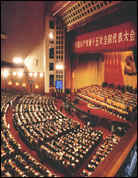
Fiscal Policy Plays Bigger Role |
|
He told reporter that the active fiscal policy that China adopted over the past three years has helped secure an annual economic growth higher than 7 percent in China, while many other economies grew slowly. The active fiscal policy has been effective to push up economic growth and increase the fiscal revenue of the government, according to Xiang. He noted that thanks to the active fiscal policy, the economy has shown important signs that it had improved for the better earlier this year. In contrast to the tight fiscal policy that China used to effectively curb inflation in the early 1990s, the adoption of an active fiscal policy has added new experience to China's management of the macro-economy, according to Xiang. Noting that the United States has sustained long-term growth with its technological power and that some Asian economies are quickly coming back through restructuring, he said that China's economic reform still lacks the impetus of system and technological innovations. Therefore, he said that China has to maintain the scale of the active fiscal policy in the near future so that it will not be in a disadvantaged position in the resurgence of the world economy and intensified international competition. During the ninth Five-Year Plan period that extends from 1996 to 2000, the Chinese government has strengthened its macro-economic control muscles by reversing the trend of dwindling share of fiscal revenue in the gross domestic product (GDP). During 1996 to 1999, fiscal revenue of the government increased at an average rate of 128.4 billion yuan every year. The share of fiscal revenue in GDP rose from 10.7 percent in 1995 to 13.9 percent in 1999. The ratio is expected to rise further to 14 percent in 2000. According to Xiang, the Chinese government has also improved the effectiveness of its fiscal policy by optimizing budget expenditures. During the ninth five-year plan period, the Chinese government increased spending on infrastructure construction, reform of state-owned enterprises, the development of a social security system, science and technology, education, agriculture, reform of the purchase and sale of grain, the army, armed police, law enforcement organs and national defense. Xiang said that the increased expenditures have made important contributions to promote reform, development and social stability. He said that over the period, the Chinese treasury has increased transfer payment to local governments in the central and western parts of the country. In 1999, the central government made 35.8 billion yuan of transfer payment to central and western areas. The figure is expected to grow to 60 billion yuan and remain at the same level in the next few years. This will be the largest amount of transfer payment that the central government has made to this area since 1994. The money was aimed to narrow the gap of development between the eastern and western parts of China. (Xinhua 10/10/2000) |
